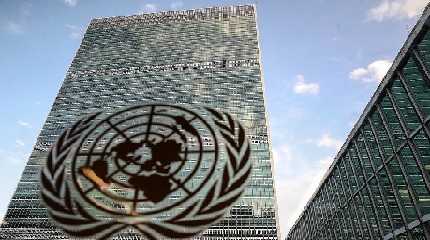
UNITED NATIONS, Oct. 31 (Xinhua) -- Attempts by the United States, Canada and a few other countries to smear the human rights situation in China were once again defeated on Monday as a majority of United Nations (UN) member states voiced support for China.
At a meeting of the Third Committee of the 77th session of the UN General Assembly, Cuba's representative delivered a joint statement on behalf of 66 countries in resolute support of China, stressing that Xinjiang, Hong Kong and Tibet-related issues are China's internal affairs, and opposed politicization of human rights and double standards, or interference in China's internal affairs under the pretext of human rights.
The Third Committee of the UN General Assembly discusses human rights and social development issues. Since 2019, the United States has gathered a group of countries four times to smear China on human rights issues, which were firmly opposed by the vast majority of countries and all ended in failure.
In a joint statement on Monday in support of China on behalf of six Gulf states, as well as Yemen and Libya, Saudi Arabia's representative emphasized the objective, constructive and non-political principle on human rights issues, calling upon all states to follow the purposes and principles of the UN Charter and the Universal Declaration of Human Rights, and to respect national sovereignty and non-interference in internal affairs.
Reinforcing the momentum in support of China, Venezuela's representative delivered a joint statement on behalf of 19 members of the Group of Friends in Defense of the Charter of the United Nations, criticizing that some governments have been unable to fully guarantee the right to non-discrimination against their own citizens, while illegally imposing unilateral coercive measures, which has become a modern form of systematic discrimination.
During the meeting, many other countries expressed support for China in their national statements, spoke highly of China's achievements in the development of human rights, and called upon all countries to uphold multilateralism and solidarity, and to promote and protect human rights through dialogue and cooperation.
In addition, a statement of the Non-Aligned Movement made at the committee on behalf of 120 developing countries opposes, in no uncertain terms, selectivity and politicization, as well as country-specific human rights mechanisms and resolutions targeting developing countries, said Dai Bing, the charge d'affaires at the Chinese Permanent Mission to the United Nations, in his remarks.
"What is right and what is wrong is all too clear; so is the sentiment of the international community," Dai said.
No matter how the United States and a handful of other Western countries word their anti-China joint statement, the malicious political intentions contained therein cannot be kept under wraps, and their machinations are doomed to failure, Dai said.
No matter how those countries, the United States in particular, hype up the stories they fabricated, they cannot obliterate the progress of the human rights cause in China's Xinjiang region, which is a fact, he said.
Dai underscored that the real purpose of the United States and some other Western countries creating an uproar about Xinjiang is to destabilize China, obstruct China's development and maintain their hegemony by exploiting human rights issues, making and spreading lies about Xinjiang.
The envoy stressed that by applying double standards on human rights, the United States and some other Western countries have set the bar for hypocrisy.
The United States and the European Union have named and shamed dozens of UN member states, but they feign ignorance of their own vile human rights records and those of their allies, he said.
Dai pointed out that the core group of countries that signed the anti-China joint statement essentially belong to the club of former colonial powers.
They consider themselves "human rights drillmasters." They seem to have forgotten the bloodbath, slave trade, plunder of resources and genocide that they once visited upon Asia, Africa and Latin America, he said.
A minority of Western politicians are only interested in governing their countries with slogans and engaging in grandstanding under the banner of human rights, in an attempt to divert the public's attention from domestic problems, he said.
"They are not even capable of helping their own people have a better life. Who would buy their story that they genuinely care about human rights in other countries?" asked Dai.




